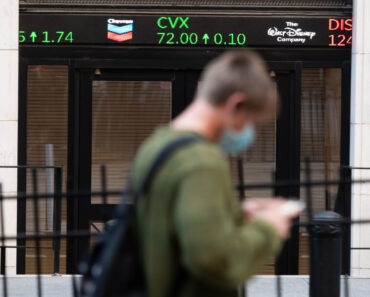This post was originally published on this site
As quarantined TV fans clamor for escapist entertainment to binge during the current global coronavirus pandemic, could a series about a suicidal Brit grieving his dead wife be a panacea for our collective fear and suffering?
Ricky Gervais, the Emmy-winning creator and star of Netflix’s After Life, says there is a particular comfort in seeing characters struggle and mourn, especially at a time when human connection has never been a more precious commodity.
Fortune spoke by phone on March 29 with Gervais (then a few weeks into sheltering-in-place in London with longtime girlfriend, producer Jane Fallon) about how it feels to unveil the second season of his handcrafted dramedy amid so much suffering, how atheism inspires him to “make the most of living,” why Larry David gets away with jokes he never could, and how honesty is now his most powerful currency.
How are you holding up so far? Is your family safe?
We are okay. We have enough booze to last us and haven’t had to panic-buy anything. And I’m eating and drinking too much as usual. I know of people who’ve been sick, and a few family members think they may have had the virus, but they don’t know for sure. I think I have it every day now! There’s just so much misinformation. It’s quite frightening. All my fears are for other people. I haven’t got it bad. No complaints.
That’s a change for you.
[Laughs] Yeah, I’ll generally complain about anything.

So much blame is being hurled at our leaders during this time, yet you generally avoid getting political in social media. What’s been your approach to connecting with fans in the past month?
I never get political—and not because I think would alienate an audience. I just know that I’d personally be a terrible leader. When I first joined Twitter, I’d do a joke that’d get hundreds of “likes.” But if one person says, “I don’t like it,” I’d delete it. I want to be liked way too much. So I’ve been doing Twitter live in the last few weeks—I’ve joked that I’m like Churchill during the war, bringing morale up—but you don’t want to be too flippant or too down. It’s a fine line I’m not used to worrying about. When people see me perform live, what’s happening in the outside world doesn’t usually matter.
You couldn’t have imagined what a captive global audience you’d have for season two of After Life, which is excellent, but somehow even more depressing than season one. Is this the best or worst possible time for viewers to watch a show about a man who is suicidal over his wife dying from cancer?
I’d never had tens of millions of people watch a show of mine, nor have such an emotional connection to it, as I did with season one. My agent got 300 letters! What I learned from that was: Everyone is grieving all the time, and the older you are, the more you have to grieve about. People would tell me on the street, “I lost my brother the week before I watched the show,” or “My wife’s going through chemotherapy, and we watched it together.” And this brings me to the second thing I learned, which is: People like to watch things about what they’re grieving. It’s good to talk about it. I also think we like watching things about our lives if they are done well, particularly about taboo or niche topics. People are tired of having things watered down for them. After Life could never be on network television. Those show creators have good intentions like, “I’m gonna do a series with real, grownup themes,” but someone always comes along and says, “If you change that, you’ll get more viewers.” I don’t know why we think that people can’t take seeing hard things; they’re already talking about them at work and at home.

It’s probably because television has, since the beginning, been about selling aspiration. Programming has long reflected a way of life that most people aren’t living, and the advertising required to keep shows on the air has to support a skewed reality.
Yes, and I see why that had to be, especially in a postwar world. We needed optimism and positivity. I actually think of After Life as aspirational; talking about grief, death, and terrible things in an interesting, funny way is uplifting. Humor is meant to help us get over bad things.
It’s also meaningful, and rare, to see a middle-aged man be so vulnerable and broken. It’s certainly the most heart-wrenching, dramatic acting I’ve ever seen you do.
Oh, thank you. Yeah, you don’t often see a hero being so screwed up and flawed, and not in a cool way like, “He’s screwed up because he’s a hard-drinking womanizer! That’s his flaw!”
Like James Bond.
Exactly. As opposed to just being a fat little putz who misses his dead wife. I’ve always liked exploring heroism in ordinary things. It’s hard to be normal. It’s hard to be alive. The show is obviously a study in grief, mental illness, and addiction, but also just surviving everyday challenges.
And that it’s okay to not put on a brave face to make other people feel better.
Yes. And Tony is aware that his situation is quite heavy for some people. There’s a line where he says, “I should be nice at least to the people who’ve tried [to help me].” Even though he’s tried to become a psychopath, he’s nice to the dog, his nephew, the new girl at work, and old lady in the graveyard. Being cruel is not who he is.
When have you personally felt the most grief-stricken in your own life?
When I lost both parents. I also lost my oldest brother last year.
I’m very sorry.
Yeah, thank you. Losing grandparents and parents is the natural order of things. But losing a sibling or a spouse isn’t. Another theme I’ve explored in the show is the idea of a spouse saying, “I want to go first. I want to die first.” But that’s selfish!

To not want to be around for the suffering that follows.
Yes. [Penelope Wilton’s] character, Anne, says in [season one]: “I’d rather live missing him than have him missing me,” which is a beautiful, twisted piece of altruism. She’s basically saying, “I am suffering more than anything at the moment, but I’m glad he isn’t.” It’s selfish to want to “go first” and bittersweet, particularly if you believe there’s no afterlife. In that case, you don’t fear death, because there’s nothing to fear. But what you do know is this life is all you’ve got, so what a tragic waste to throw it away before you have to!
Does this mean atheists naturally live more robust lives than those who believe in a version of heaven?
That’s interesting. People think because I’m an atheist I don’t care about dying, which couldn’t be further from the truth. It’s not that we think we’ve got nothing to live for; it’s that we know we’ve got nothing to die for, and that makes us want to make the most of everything. But it still comes down to quality of life, which for me is more important than longevity. Like putting a pet down—it’s most beautiful thing one can do.
Speaking of, I was very sorry to see that your sweet cat Ollie passed away.
Thank you. She was such a lovely, little soul. She was 16-and-a-half. We bawled our eyes out, but knew it was the kindest thing to do. And no one should ever worry about doing that for themselves. I’m a big campaigner for assisted suicide. It should be everyone’s right; no one should have to bargain or beg for deciding when they die.

In the new season, Tony’s brother-in-law Matt is still seeing the terrible, caustic therapist he saw in season one. To what degree are you skewering the practice of therapy with that character? Are you drawing at all from your own experience?
I’ve actually never been to therapy, nor suffered from depression or mental illness that I know of. And that’s just luck. [Therapist actor] Paul Kaye is amazing, isn’t he? I put everything I knew about “toxic masculinity” into his character. The point I’m also making is that we’re all narcissists now, especially on social media. People are rewarded for bad behavior—and then they write a book about it. [Laughs]
This season you’ve also gone more out of your way to humanize side characters—like Roxy the sex worker—who might otherwise be throwaway. She isn’t pathetic or sad; rather, a happy, intelligent woman with an emotional inner life who offers friendship and comfort to Tony when he needs it most.
I’ve tried to create a world where’s there one of everyone in this strange little village. People assume after seeing me host the Globes or do standup that I’m the most judgmental person in the world. That’s not true at all. I let everyone off the hook because we’re all flawed. I’ve often said the one thing from the Bible that should be taught is “Let he who is without sin cast the first stone.” Comedy should never be judgmental; it should be always about the idea that we’re all fucking idiots.

That said, you have gotten blowback in the past for tweets and jokes you’ve made at the expense of transgender people, including a prolonged bit in your 2018 Netflix special Humanity about Caitlyn Jenner. There’s a scene in After Life this season where Tony’s dopey colleague Lenny opens up about his confusion surrounding what it means to be transgender, and Tony guides him through the proper words to use. Is this vignette meant to reinforce to critics that you aren’t in fact transphobic?
That scene is all about how some people really don’t understand [trans issues], nor how to keep up with the proper terminology. I’ve always been pro–trans rights as I am for all human rights. I think [the backlash] came when I made a joke about a person who happened to be trans. You can joke about race without being racist; you can joke about a trans person without being transphobic. The offense comes when people confuse the subject of a joke with the actual target. They’re not the same. I did a joke once about peanut allergies, and a woman complained because her daughter was allergic to peanuts. She was very emotional. I told her I also make jokes about AIDS, cancer, famine, and the Holocaust. She said, “Yes, but the Holocaust didn’t kill children.” What? You can’t be logical when you care that much about something.
Why do you think someone like Larry David, who like you is a Caucasian, cisgender straight male, is able to get away with jokes about transgender people, of which there were a few in the most recent season of Curb Your Enthusiasm? Transgender actors Laverne Cox and Chaz Bono even appeared on the show for said gags, one of which centered on Bono’s character having such a large penis he would accidentally knock things over with it. It’s hard to imagine you emerging unscathed from such material.
There are a few reasons: Larry doesn’t care about realism or the emotional impact of his comedy. Everyone goes back to square one after each joke, where in my comedy and shows, I deal with the fallout. People know what he’s doing is a cartoon, and even the players don’t take it seriously. The other thing Larry does right is that he doesn’t bother to explain himself. I ask for it by doing that. [Laughs]
Back to After Life, how much are you pulling from your relationship with Jane in creating a portrait of Tony’s relationship with his late wife? How does she feel about the show?
She loves it, and it’s all influenced in some way by real life. I wanted to make it feel like a real relationship. It’s funny—someone at a junket asked us, “Are you worried their relationship seems too perfect? That the video flashbacks aren’t believable?” And Kerry, the actress who plays Tony’s late wife, Lisa, said, “Why would they film their arguments?” [Laughs]

Well, there’s certainly plenty of sad footage of Lisa for Tony to pore over, which he does.
And those moments allow us to go a bit more brutal. There’s a moment this season, without spoiling it, that kills me. I choked up every time I watched it in the edit. It’s also interesting to realize that all of our “afterlives” are now going to be on video and film. There are maybe 10 pictures of me from growing up. But I’ve got 50 photos of me and my cat in the bath, hundreds of me sitting on the sofa and making stupid faces. And video of everything. I heard once that more pictures were taken in 2014 than in the rest of history put together.
And most were of the Kardashians.
Yes, of course—photos of people pouting. Narcissism is the new genetic trait. I mean, they had to ban selfies at Auschwitz last year.
Looking back at your career, from The Office to Extras to Derek, you’ve rarely acted in anything that you didn’t also create. Is that because what most inspires you is that which is the most personal?
People do ask me to act in their stuff, and I always have to explain to them why they can do better than me. [Laughs] I’ve done Night at the Museum, Sesame Street, writing The Simpsons for fun, but I don’t count them as “my work.” It just doesn’t excite me to pop up in a film I didn’t write or direct. If you asked what I’ve done in my career I’d say I’ve made three or four sitcoms, a couple of movies, and stand-up. I don’t want to get more famous or get richer; I want to be more honest, and I don’t care if the number of people I connect with dwindles as a result. What excites me most is humanity; people saying, “Your show helped me through a terrible time.” That makes me want to skip down the street.
More must-read stories from Fortune:
—Chris Hemsworth calls Extraction the most exhausting shoot of his career
—True History of the Kelly Gang director, stars on their hypnotic outlaw saga
—Hollywood artists are creating PPE for the medical community
—China’s movie theaters are closed again, causing anxiety for studios
—How Mrs. America designers revived a ’70s feminist showdown
Follow Fortune on Flipboard to stay up-to-date on the latest news and analysis.






